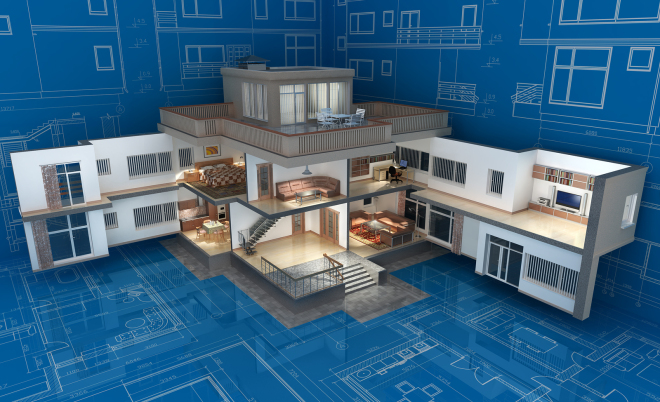The Backbone of the Connected Home
By Guest | Posted March 22, 2016This blog comes to us from Jamie Lee Corpuz, Marketing Communications Specialist with Pakedge. Control4 and Pakedge recently joined forces to deliver an even more robust smart home experience to customers around the globe.
Read more about the acquisition here.
Network stability is the foundation for every smart home. It’s not just a “nice to have,” it’s a requirement.
Whether you spend $2000, $10,000 or $100,000 on an AV system or a smart home system, its performance is only as good as the network it runs on. Would you buy a high performance Lamborghini sports car and fill it with unleaded regular gasoline? Of course not, but that is exactly what you do when you use the integrated modem/router/wireless unit supplied by the Internet Service Provider, or an integrated router/wireless “all in one” unit purchased from the local electronics store.
It’s no surprise that people feel this way about the network. Unlike your AV equipment or the smart home system that you can see, touch, feel and experience, networking equipment is largely invisible; it sits hidden and out of mind somewhere—on a shelf, in a closet, in a basement, or in a rack—silently working 24 hours a day, 365 days a year, ensuring that your services, videos, emails, etc., get to where they are needed. The only time you think about it is when you lose connectivity, or when your system doesn’t work the way you thought it would.
But this is exactly why the network matters. It is the foundation of your smart home and your AV system. It is the single most important thing that you should never worry about. The more devices you connect, the smarter your home is, the more you use cloud-based services, the more important your network becomes. If you’ve ever experienced lower than expected download speeds, poor quality video streaming, heard every other word on a conversation on a Voice over IP (VOIP) phone service, had intermittent wireless connectivity, or your connected devices just don’t seem to work well (or consistently), then you’ve likely experienced a network break down. Ironically, most people don’t realize it’s a network issue, and they falsely blame the AV system or the device for the problem.
An enterprise grade network is the “secret” ingredient in pro AV and smart home installations. Here are the key reasons why:
Designed for high performance.
Enterprise class networks are purpose built for performance. They use faster CPUs and memory to process more streams of high bandwidth traffic (including UHD/4K). They incorporate advanced traffic management technologies like VLANs for traffic segmentation, prioritization algorithms to process low latency voice and video streaming traffic, IGMP protocols for multicast traffic processing, and special bandwidth management and port controls for precise throughput performance.In addition, they contain gigabit speed Ethernet and fiber optic ports to keep up with increasingly fast ISP speeds and incorporate high power transmitters for seamless wireless coverage while utilizing advanced algorithms to mitigate interference. Advanced thermal management technologies keep the network equipment cool and running efficiently over its lifetime.
Your system, your way.
No two AV systems or smart homes are exactly alike. No one will have the same devices you do connected to the network in the same way, support the same applications, or operate in the same site conditions. Unlike consumer grade networks, enterprise class systems give you full control and allow your network to be fully customized, configured and tuned for maximum performance, taking into consideration your specific devices, applications, usage patterns and site conditions. As your needs and network changes in the future, enterprise class networks can be retuned and optimized.Scalable and future ready.
Change is constant. Is your network ready for the future? How you use your network today is not the same as how you used your network five years ago, and it will not be the same five years from now. New devices, new applications, and new services are being developed and launched into the marketplace every day. Enterprise grade networks are built to scale and adapt to planned and unplanned traffic increases and applications. Faster CPUs and memory, gigabit data ports, Power over Ethernet (PoE) ports, and full configuration management enable you to integrate almost everything into your network, its functional usefulness, and can hold off obsolescence.Reliability.
Consumer grade network equipment is designed around low price points and profit margins to target the “good enough” mass-market customer. This is accomplished by restricting performance, limiting features, using lower grade components, offer short warranties and limited tech support. Some brands are nothing more than marketing brands, with their logos on a generic “white box” product made in Asia.In contrast, enterprise grade equipment uses higher-grade components with tighter manufacturing and performance tolerances to withstand heavy-duty conditions. They use higher-grade memory and CPUs, manufactured with the latest semiconductor fabrication techniques. They incorporate features like WAN failover and port link aggregation to ensure service continuity. They provide firmware updates on a regular basis in order to address bug fixes and performance optimizations.
Pro-level support.
In order for consumer grade equipment manufacturers to maintain profitability at the low price points they sell the equipment at, they have to minimize costs. Take tech support, for example. Most companies make it difficult to reach a live tech support representative, and attempt to drive you towards a website /online self-service support system. Those that provide telephone based tech support, do so with undertrained, low paid “script readers” in an overseas call center.Enterprise grade manufacturers employ a two level tech support model – tech support is provided to the end user through a local authorized reseller and distributor, who is trained and certified by the manufacturer, who knows your system, has installed it and can fix it right the first time. In turn, the manufacturer provides dedicated tech support to the authorized reseller and distributor, through its fully trained and experienced tech support staff. These teams typically work closely with engineering to resolve complex issues. As products become more complex, a frequent issue is compatibility with other manufacturers’ products. Enterprise tech support teams work with other manufacturers’ tech support teams in a coordinated manner to resolve issues.
Lifetime value.
Although enterprise grade equipment is initially more expensive than consumer grade equipment, it provides a much better value over the system’s lifetime, an overall lower total cost of ownership, and a better investment. It’s simple—it is more reliable and it lasts longer. They have longer warranties. It is scalable, expandable, and can be tuned/optimized to support your needs as your network expands. Many manufacturers offer free lifetime technical support and firmware updates so that your system is always supported.Never settle for less.
Network professionals and industry magazines have spoken. For three years in a row, Pakedge has been voted brand leader of AV networking. More than a manufacturer, Pakedge is made up of innovators. Based in the San Francisco Bay Area, the California brand designs and builds the highest quality devices with the value added bonus of sophisticated intelligence features that optimize your network.
GREAT READ: Control4 Acquires Pakedge: A Perfect Merger of Home Automation and Networking
See why CE Pro says the merge between Control4 and Pakedge could be the
"smartest acquisition ever in the home-technology channel."
We take your privacy seriously and we promise we won't spam you; please see our privacy policy for details. By submitting your information, you are confirming that you are 18 years of age

